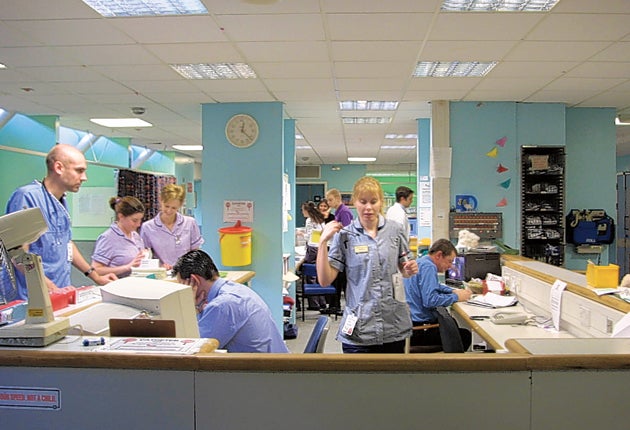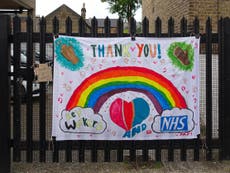Too many people in need of medical attention stayed at home to protect the NHS – the government must change its message
If people remain fearful to come forward for help, there will be serious, long-term ramifications for both patients and doctors


Your support helps us to tell the story
From reproductive rights to climate change to Big Tech, The Independent is on the ground when the story is developing. Whether it's investigating the financials of Elon Musk's pro-Trump PAC or producing our latest documentary, 'The A Word', which shines a light on the American women fighting for reproductive rights, we know how important it is to parse out the facts from the messaging.
At such a critical moment in US history, we need reporters on the ground. Your donation allows us to keep sending journalists to speak to both sides of the story.
The Independent is trusted by Americans across the entire political spectrum. And unlike many other quality news outlets, we choose not to lock Americans out of our reporting and analysis with paywalls. We believe quality journalism should be available to everyone, paid for by those who can afford it.
Your support makes all the difference.The public showed immense support for NHS workers during the first wave of Covid-19, with millions stepping out onto the streets every Thursday to clap key workers. For some, that support extended much further, to the point that, when they needed medical attention for an illness or injury not related to coronavirus, they stayed at home.
According to a YouGov survey of adults in Great Britain, commissioned by the Medical Protection Society (MPS), four in 10 (39 per cent) of those who needed medical attention for a non Covid-19 illness or injury between March and July waited longer than a week, or even more than a month, before seeking help – or they did not seek help at all. Over a third (35 per cent) said they did not want to bother NHS staff already under pressure.
Consideration for healthcare professionals was not the sole reason why people stayed away from healthcare facilities during that time. Thirty-three per cent felt that an issue not related to Covid-19 would not be considered a priority, 19 per cent thought they were adhering to the government's "stay at home" advice, and 17 per cent said the government created too much fear in its desire to protect the NHS from a deluge of patients.
The government did aim to reduce the number of patients attending healthcare facilities, so the NHS could focus on Covid-19, and as part of this, routine investigations and outpatient appointments were suspended. But I doubt it intended the “Stay Home. Protect the NHS. Save Lives” slogan to be taken quite so literally, and with such worrying consequences.
The first official data released after the lockdown led to medical leaders appealing for patients with serious conditions to seek help, as figures showed a lower number of A&E visits in March than at any time since current records began – a 29 per cent drop compared to 2019, including a 50 per cent drop in heart attack attendances. Decreases in paediatric emergency department attendances were also reported in some areas and GPs raised concerns that people were ignoring early signs of cancer.
There is no doubt in my mind that if people remain too fearful to come forward for help when they need it, there will be serious, long-term ramifications for both patients and doctors.
In the survey, 44 per cent of those patients who delayed or did not seek medical attention when they needed it, experienced ongoing pain or suffering. Thirty-two per cent said the illness or injury got worse, and 30 per cent said there had been a longer delay before receiving a diagnosis or treatment. Two per cent said their illness or injury had become untreatable and a further two per cent said the delay led to the death of a relative.
Doctors have also suffered the consequences from people not seeking help straight away. Deteriorating medical conditions can be more difficult to treat, and many of those who eventually sought help, have been added to the already extensive referral backlog, which exhausted doctors are desperately trying to deal with.
Doctors have told us they are also concerned they will become embroiled in medicolegal disputes over who is to blame for delayed diagnoses, ongoing suffering or a death of a family member. This is an impossible situation for a doctor – and unfortunately one of many, which is why MPS is calling for emergency laws to protect doctors from unfair action in relation to the care they provide during the pandemic.
As we tackle a second wave of Covid-19, approach winter, and are seeing local lockdowns and restrictions, how can we avoid a repeat of this situation?
It is a complex issue; however, the message the government gives out is key. It must strike a careful balance between protecting the NHS and ensuring people can – and feel able to – seek medical attention for non Covid-19 issues.
There are many lessons to be learned from our handling of Covid-19 – lessons for society, the government, and the medical profession. These should improve our management of subsequent waves of Covid-19 or indeed future pandemics. Ensuring the message gets across that the NHS is still safe and open for those who need it, must be one of those lessons.
Dr Rob Hendry is Medical Director at the Medical Protection Society (MPS)




Join our commenting forum
Join thought-provoking conversations, follow other Independent readers and see their replies
Comments